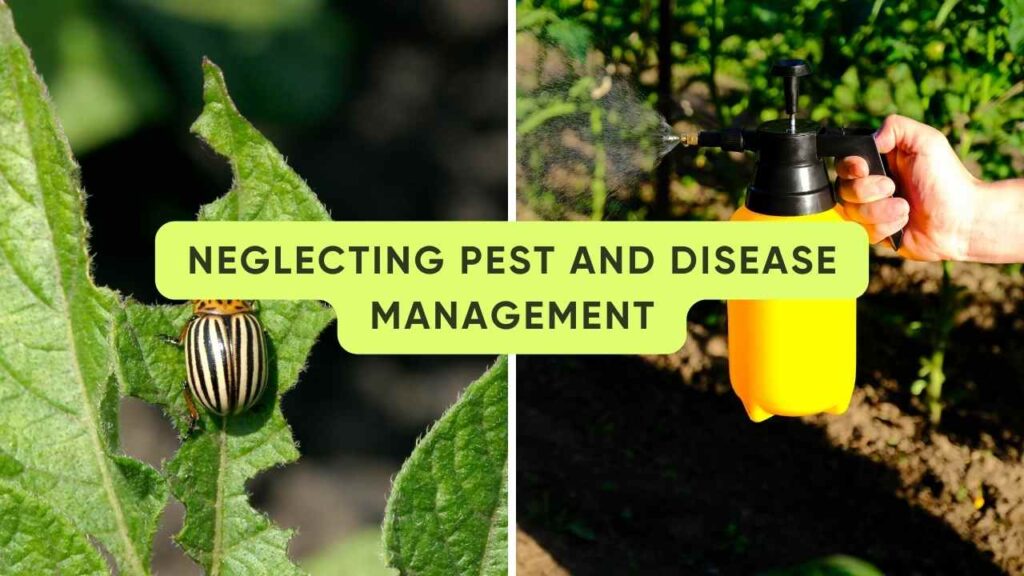Have you ever found yourself gazing at your garden, wondering why those vibrant flowers you planted aren’t thriving as you expected? Well, fear not! We’re here to explore common gardening pitfalls that even the greenest thumbs might stumble upon. Let’s embark on this journey to make your garden the envy of the neighborhood.
Lack of Planning and Research
Sunlight Sorrows
Planting without considering sunlight needs is like sending your leafy companions on an unexpected sunbathing retreat. Just like we all have our favorite spots to catch some rays, plants also have their preferences. Imagine planting sun-loving blooms in the shady corner—they’d be as disappointed as missing out on a beach day. Before you start your green adventure, take a moment to be your plants’ travel agent. Assess your garden’s sunlight patterns; know the sun-kissed spots and the shadowy corners. Match your plants with the right light intensity for a garden that thrives like a well-deserved vacation.
Soil Surprise
Neglecting soil testing before planting is akin to selecting a spa without reading any reviews—it’s a gamble with your garden’s well-being. Soil, the unsung hero of gardening, deserves a pampering session too. Think of it as your garden’s spa day. Skipping soil testing is like embarking on a spa day without checking reviews—it might end up causing more stress than relaxation. Before introducing your plant pals to their soil spa, take a moment for a checkup. Assess its pH, nutrient content, and texture. This helps you pick plants that will thrive in your unique soil sanctuary.
Overwatering and Underwatering Woes
Drowning Drama
The tale of overwatering unfolds like a Shakespearean tragedy in your garden—a romance gone wrong. You shower your leafy companions affectionately, but too much can lead to a watery disaster. It’s like drowning them in love, quite literally. The signs are dramatic: leaves yellowing stems wilting, and an unpleasant aroma lingering in the air. Your once lush oasis becomes a waterlogged swamp. Fear not, fellow gardener! The solution lies in a delicate balance. Allow the soil to dry between waterings. Your plants appreciate a healthy relationship with H2O, not a drowning experience. Let your garden breathe and thrive!
Thirsty Troubles
Picture your garden as a parched desert and your plants as weary travelers searching for an oasis. Underwatering is a silent, slow-motion crisis—a garden drought. Your green companions gasp for a sip of water, their roots reaching out like desperate hands in the scorching sun. The signs are subtle but impactful: leaves drooping, soil resembling cracked earth, and an overall demeanor of wilting distress. Keep the soil consistently moist to rescue your garden from these thirsty troubles. It’s like keeping a refreshing water bottle handy for your plants to sip whenever they feel the heat.
Improper Plant Selection
Climate Clash
Choosing plants oblivious to your climate is akin to inviting a snowman to a beach party—a mismatch destined for disaster. Plants, much like guests, have preferences. Understanding your region’s hardiness zone is the first step in averting a climate clash. Research, dear gardener, is your garden’s compass. Plants that thrive in your local climate are like guests who appreciate the weather-appropriate dress code. Save your garden from the awkward chill or heat by selecting green companions that dance harmoniously with your region’s climate. Let your garden celebrate botanical compatibility, where every plant feels at home.
Size Matters
Picture this: adopting a pet without considering its size, forcing it into an uncomfortably tiny space. Your garden plants have feelings, too, and cramming them into tight spots is like making them wear ill-fitting shoes. Each plant is a unique individual with its own growth trajectory. To avoid size-related drama, read the plant labels like cherished biographies. Know their mature size, and be the thoughtful host that provides ample space for them to flourish. Let your garden be a spacious haven where plants can stretch their roots and leaves, creating a symphony of greenery in perfect harmony.
Poor Soil Management
Fertilizer Fiasco
Imagine your garden as a grand feast and fertilizer as the spice that adds flavor. However, overloading your garden with fertilizer is like indulging in an all-you-can-eat buffet every day—it may seem splendid initially, but it’s a recipe for disaster. Plants, much like our bodies, need a balanced diet. Overfeeding them disrupts this delicate equilibrium. The solution lies in moderation. Treat your garden to a well-balanced nutritional meal, following the instructions on the fertilizer package. Your green companions will thank you for flourishing with vitality, turning your garden into a healthy, vibrant banquet of nature.
Compaction Catastrophe
Picture your garden soil as a cozy bed for your plant companions. Compaction transforms this once plush mattress into a rock-hard disaster, akin to sleeping on concrete. Your green pals need a comfortable place to lay their roots, not a compacted catastrophe. It’s like expecting a good night’s sleep on a bed of rocks. The solution? Aerate the soil, allowing it to breathe. Think of it as giving your garden a fluffy pillow. Introduce compost to alleviate compaction, providing your plants with the soft, airy environment they deserve. Your garden will thank you with flourishing blooms and contented greenery.
Neglecting Pest and Disease Management

Critter Chronicles
Ignoring the insect world in your garden is like leaving the front door open for unexpected guests—critters seeking refuge without an invitation. Aphids, spider mites, and their entourage may turn your flourishing garden into an uninvited wildlife party. The signs are subtle: nibbled leaves, mysterious holes, and a slow decline in plant vibrancy. To protect your green haven, play the role of a vigilant bouncer. Regularly monitor your plants for any unwanted attendees. Spotting pests early is like thwarting a potential garden heist before they can steal the show. Ensure your garden remains an exclusive, pest-free paradise for your cherished plants.
Disease Drama
In the garden theater, diseases play the role of the conniving antagonist, spreading gossip faster than whispers in a small town. Ignoring these lurking villains is like letting rumors tarnish your garden’s reputation. It’s a drama waiting to unfold. Picture your plants as the unsuspecting protagonists, falling victim to unseen adversaries. The tip to safeguard your garden’s plot twists is to learn the enemy’s script. Identify common plant diseases early on. Consider it your preemptive strike, nipping the drama before it unfolds. With this vigilant approach, your garden will be a drama-free haven of thriving greenery.
Inadequate Pruning and Maintenance
Trim Triumphs
Pruning is the stylistic touch that turns your garden into a lush masterpiece. Neglecting it is like letting your hair grow wild without a trim—chaotic and lacking finesse. Just as we visit the salon for a fresh look, plants need a grooming session, too. Pruning encourages healthy growth, shapes the visual narrative of your garden, and enhances its overall aesthetic appeal. It’s akin to giving your plants a spa day and a beauty makeover. Regularly trim away the excess, allowing your garden to showcase its beauty with a well-maintained and effortlessly elegant allure.
Garden TLC
Like any cherished relationship, your garden demands tender loving care (TLC). Neglecting it is like forgetting your anniversary—an oversight that doesn’t end well. Regular weed-pulling, watering rituals, and attentive checks on your green companions are the love language your garden understands. It’s not just maintenance; it’s a heartfelt commitment to the well-being of your leafy friends. Be the attentive partner your garden deserves; it will reciprocate with bursts of color, fragrant blossoms, and a sanctuary of tranquility. Provide your garden with the TLC it craves, and watch it flourish into a living testament of your affection.
Ignoring Environmental Considerations
Sustainable Harmony
In the eco-conscious age, gardening without considering the environment is like driving a gas-guzzler when electric cars abound. Your garden is more than just a green retreat—it participates in nature’s grand symphony. Embrace sustainable practices like a gardener turned eco-warrior. Conserve water, opt for eco-friendly materials, and become the green guardian your garden deserves. It’s more than just gardening; it’s cultivating a sustainable harmony with the earth. Transform your garden into a beacon of environmental responsibility, where every bloom is a testament to the delicate balance between nature and nurture.
Conclusion
As we bid farewell to our garden exploration, remember that every mistake is a lesson waiting to be learned. Your garden is your canvas; with a little TLC and wisdom, you’ll turn it into a masterpiece. So, go ahead, take your gardening gloves, and let your green adventure begin!
FAQs
What is the most common mistake of first-time gardeners?
For many first-time gardeners, the most common mistake resembles a spontaneous road trip without a map—a lack of planning and research. Overlooking crucial details such as sunlight needs, soil conditions, and plant compatibility often leads to a garden that feels more like a wild experiment than a deliberate masterpiece.
What are the limitations of gardening?
While gardening is a rewarding endeavor, it has limitations. External factors like climate, soil composition, and available space may constrain what you can grow. Challenges also include pests, diseases, and the unpredictable whims of nature. Yet, these limitations are merely invitations to adapt, learn, and innovate within the bounds of your unique gardening ecosystem.
What’s the best thing about gardening?
Amidst the toil and occasional setbacks, the best thing about gardening is witnessing nature’s resilience and the bountiful beauty it yields. Cultivating a garden is like co-authoring a story with the earth—each bloom and every harvest is a testament to the nurturing relationship between gardener and garden. The sense of accomplishment, the joy of witnessing growth, and the simple pleasure of being surrounded by nature’s artistry make gardening a fulfilling experience.
What are the challenges faced by plants?
Plants face a myriad of challenges in their quest for growth and survival. Overwatering and underwatering create a delicate balancing act for them. Competing for sunlight and nutrients in crowded spaces poses another hurdle. Additionally, pests and diseases lurk as potential adversaries, ready to disrupt the serene existence of your leafy companions. Yet, plants, resilient by nature, navigate these challenges with a determination that mirrors the triumphs of a well-tended garden.
You may also like:
Organic Gardening Tips: Nurturing Your Green Space Naturally



Pingback: 7 Natural Ways: How to Prevent Tomato Blight Naturally - Homebec